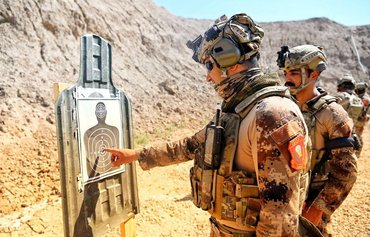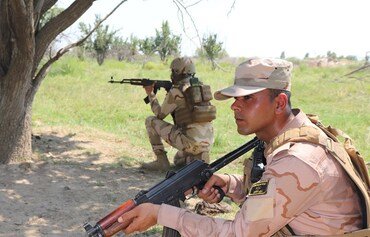After stripping the "Islamic State of Iraq and Syria" (ISIS) of territories it once controlled, Iraqi forces are now focused on eliminating any remaining offensive capabilities the group might have retained.
Joint army and tribal forces are targeting ISIS pockets and hideouts in Anbar's western desert and within liberated cities, with the support of intelligence and air cover operations.
Iraqi forces have conducted search operations in 175 villages in Upper Euphrates, extending over a desert area of 14,000 square kilometres.
By November 26th, they had seized a total of 1,000 improvised explosive devices (IEDs) hidden in various storage caches, six factories for the manufacturing of explosives, 29 car bombs and others loaded with weapons, and 12 tankers and a motorcycle.
Hunting down local ISIS elements
"The next task ahead of Iraqi forces after recovering all cities is to pursue the remnants of the enemy," said Iraq's Counter-Terrorism Service (CTS) spokesman Sabah al-Numan.
Any remaining ISIS offensive capabilities must be eradicated as they pose a threat to the safety of liberated cities, he told Diyaruna.
"Iraqi forces are currently hunting down defeated fighters who have lost their financing, guidance and leadership and are hiding in small groups here and there deep into the desert," he said.
These are local ISIS elements, he said, as foreign fighters, previously known as ISIS's elite fighters who were at the forefront of battles, no longer have a presence in Iraq, al-Numan said.
The military operations have achieved "unprecedented successes", he said, noting that Iraqi forces have reached villages and remote areas that they had not set a foot in for over a decade, destroying weapon caches that ISIS thought were safely concealed.
Tracking sleeper cells
"Another important security effort is the tracking of secret networks of terrorists," he said.
The CTS is carrying out special operations to monitor and track ISIS cells in liberated cities in order to uncover their sources of funding.
"This is the essence of our work at the CTS," he said. "Our upcoming battles depend on intelligence and proactive operations."
As part of these high-quality missions, military intelligence forces have carried out raids on hideouts inside residential areas that led to the arrest of several wanted extremists.
On Monday (December 4th), security forces raided an ISIS hideout in Wadi al-Kalal in Diyala province, killing one terror element while another blew himself up.
The Ministry of Defense on Tuesday announced the arrest of a wanted terrorist at the Aqwas checkpoint north of Tikrit on his way to Ninawa.
"The detainee is the father of three terrorists, one of whom was killed during the battle to liberate Mosul," according to the ministry's statement.
Iraqi forces have gained significant experience in tracking militants across the country, security analyst Fadhil Abu Ragheef told Diyaruna.
"Liberated cities are completely secured," he said, stressing that the information provided by local residents is key to Iraqi intelligence operations.
ISIS loses the desert
Abu Ragheef said the greatest loss for ISIS is its loss of the desert, which the group considered a safe haven for its elements.
"Our forces, supported by international coalition warplanes, secured vast desert areas located between the provinces of Anbar, Salaheddine and Ninawa, specifically in the areas known as the Rawa, Tikrit, al-Siniyeh and al-Baaj islands in the Upper Euphrates," he added.
Iraqi forces are targeting the militants' transport routes and lines of supply that extend to the border with Syria, said Abu Ragheef.
They have taken over border crossings and established security points within the desert, he said.
Anbar provincial council member Mordi al-Mahalawi said that military operations continue deep in the western desert, stripping ISIS elements of their last refuge.
"They no longer have a safe place to reorganise and store their weapons," he told Diyaruna, adding that security forces are now taking control of every inch of the country.
ISIS's presence is diminishing, and the group's remaining elements have completely lost the ability to attack, he said.
They cannot hide for long in their holes or move freely without being monitored or targeted, he said.

![An Iraqi man informs the army of 'Islamic State of Iraq and Syria' hideouts in the Anbar desert. [Photo from the Iraqi Ministry of Defense Facebook page]](/cnmi_am/images/2017/12/12/10687-Iraq-ISIS-hideouts-600_384.jpg)






